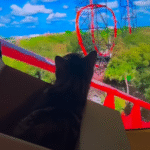Imagine watching a shy cat take its first tentative steps out of hiding—a tiny, silent victory that tugs at your heart. For many, helping a reserved or cautious feline feel safe and loved is a journey marked by patience and small triumphs. Every cat has its own story, and for those who open up slowly, the path to trust can be both delicate and deeply rewarding. If you’ve ever wondered how to encourage a hesitant cat to flourish, you’re not alone. Supporting these gentle souls is an act of empathy and understanding that can transform both your lives. Here’s how you can be the reassuring presence your cautious companion needs.
Understanding Your Cat’s Unique Personality

Every cat is a world unto itself, shaped by its past experiences, temperament, and even genetics. Some cats are naturally outgoing, while others may be reserved due to previous traumas or simply because of their innate personalities. Recognizing this individuality is the first step in providing real support. When a cat opens up slowly, it doesn’t mean they’re unfriendly or aloof; rather, they might be cautious, observant, or even a little fearful. Take time to observe your cat’s body language, such as their tail position, ear movement, and overall posture. Learning how they communicate will help you respect their boundaries and respond to their needs. Remember, what feels safe and comforting for one cat could feel overwhelming for another. By honoring these differences, you’ll foster a relationship built on trust, not pressure.
Creating a Safe and Inviting Environment

A sense of safety is essential for any cat, especially one who is slow to open up. Start by ensuring your home offers plenty of cozy, quiet hiding spots where your cat can retreat when feeling overwhelmed. Consider placing soft blankets in secluded corners, under beds, or inside covered cat beds. Make sure the environment is calm—loud noises, sudden movements, or frequent visitors can make a sensitive cat’s anxiety worse. If possible, set up a dedicated “safe room” with their food, litter box, toys, and water, allowing them to explore at their own pace. Dim lighting and gentle background sounds, like soft music, can also help reduce stress. Over time, as your cat feels more secure, they’ll begin to venture out and explore more of their surroundings.
The Power of Patience and Consistency

Patience is your greatest ally when supporting a cat who’s slow to trust. Rushing the process or forcing interaction can have the opposite effect, causing your cat to retreat further into their shell. Establish a consistent routine for feeding, playtime, and quiet companionship so your cat knows what to expect each day. This predictability builds a sense of security and helps ease anxiety. Avoid sudden changes in the environment or your own behavior, as unpredictability can be unsettling. Instead, offer gentle encouragement, and let your cat approach you on their own terms. Over time, your steady presence will become a source of comfort, and you’ll notice small but meaningful signs of progress.
Building Trust Through Gentle Interaction

Earning a cat’s trust is a delicate dance. Start by sitting near your cat without trying to touch or pick them up. Use a calm, soothing voice to reassure them. Offering treats or favorite toys from a distance can also help bridge the gap, showing your cat that good things happen when you’re around. Slow blinking—a soft, lingering blink—can signal affection and relaxation, and many cats respond positively to this gentle gesture. If your cat allows, try offering a hand for them to sniff before attempting gentle petting, focusing on areas they seem comfortable with, such as the cheeks or under the chin. Watch for signs of relaxation, like purring or kneading, and always back off if your cat shows discomfort. These small, respectful interactions lay the groundwork for a trusting bond.
Encouraging Exploration and Play

Once your cat feels a bit more secure, encouraging exploration and play can help boost their confidence. Interactive toys, like feather wands or laser pointers, offer great opportunities for engagement without the pressure of direct contact. Puzzle feeders and treat-dispensing toys can stimulate your cat’s mind and reward curiosity. Place new toys or scratching posts near your cat’s favorite hiding spots to gently pique their interest. Avoid overwhelming them with too many new items at once; instead, introduce changes gradually and celebrate any signs of curiosity or participation. Playtime not only helps your cat burn off nervous energy but also strengthens your bond through shared fun and discovery.
Supporting Socialization With Other Pets and People

If your home includes other pets or frequent visitors, it’s important to manage introductions thoughtfully. Allow your cat to observe new animals or people from a safe distance, and never force interactions. Use scent swapping—rubbing a cloth on your cat and then on the other pet—to help them become familiar with each other’s presence. If possible, supervise short, calm meetings, rewarding both pets for relaxed behavior. With people, ask guests to ignore your cat at first and let the cat make the first move. Over time, positive experiences with others will reinforce your cat’s growing confidence. Remember, some cats may always prefer a quieter life with limited socialization, and that’s perfectly okay.
Recognizing Progress and Celebrating Small Victories

Progress with a reserved cat is often slow and subtle, but every step forward is worth celebrating. You might notice your cat spending more time in shared spaces, accepting gentle pets, or even initiating play. These small milestones are powerful signs of trust and growth. Keep a journal or take mental notes of these changes, as it can be encouraging on days when progress feels slow. Celebrate with extra treats, gentle praise, or a favorite activity. Your cat’s journey is unique, and your unwavering support makes all the difference. Each little victory adds up, paving the way for a deeper, lasting bond between you and your feline friend.

Linnea is a born and bred Swede but spends as much time as possible in Cape Town, South Africa. This is mainly due to Cape Town’s extraordinary scenery, wildlife, and atmosphere (in other words, because Cape Town is heaven on earth.) That being said, Sweden’s majestic forests forever hold a special place in her heart. Linnea spends as much time as she can close to the ocean collecting sea shells or in the park admiring puppies.






